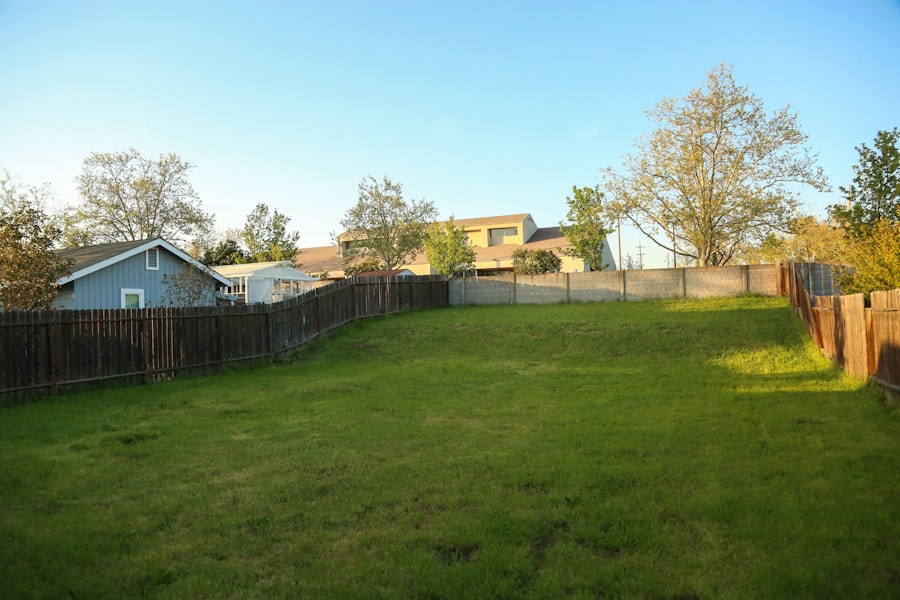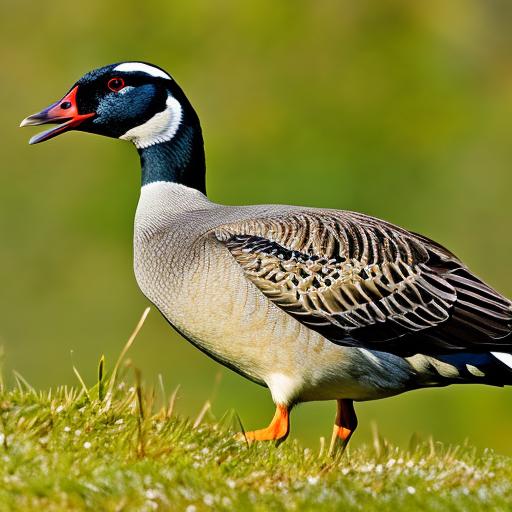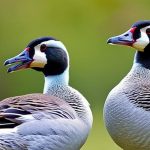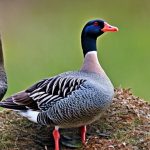Canadian geese are a common sight in many parts of North America, including Canada and the United States. These large waterfowl are known for their distinctive honking calls and V-shaped flight formations. While they can be a beautiful addition to the natural landscape, they can also become a nuisance when they invade your yard. Understanding the behaviour of Canadian geese is important in order to effectively deter them from your property.
Key Takeaways
- Canadian geese are social birds that mate for life and are highly protective of their young.
- Geese may invade your yard for food, water, shelter, or nesting sites.
- Canadian geese can pose health risks due to their droppings and aggressive behavior.
- Natural ways to keep geese away include planting certain vegetation and using decoys.
- Physical barriers, such as fences and netting, can be effective in preventing geese from entering your yard.
Understanding the Behaviour of Canadian Geese
Canadian geese are migratory birds, meaning they travel long distances between their breeding and wintering grounds. They typically breed in northern regions and migrate south for the winter. Understanding their migratory patterns can help you anticipate when they may be more likely to invade your yard.
During the breeding season, Canadian geese exhibit specific nesting habits. They prefer to nest near bodies of water, such as ponds or lakes, where they can easily access food and water for themselves and their young. They build large nests made of grasses and other vegetation, usually on elevated areas near the water’s edge.
Feeding behaviour is another important aspect of Canadian geese behaviour to understand. They are primarily herbivores, feeding on grasses, aquatic plants, and grains. They will graze on lawns and fields, often leaving behind droppings that can be unsightly and unsanitary.
Identifying the Reasons Why Canadian Geese Invade Your Yard
There are several reasons why Canadian geese may invade your yard. One of the main reasons is the availability of food sources. If you have a well-maintained lawn or field with plenty of grass, it can be an attractive feeding ground for these birds.
Water sources are also important to Canadian geese. If you have a pond or lake on your property, it can provide them with a convenient place to swim and find food.
Nesting sites are another reason why Canadian geese may invade your yard. If you have an elevated area near a body of water, it can be an ideal location for them to build their nests and raise their young.
Finally, Canadian geese may invade your yard in search of protection from predators. They are more likely to choose areas that offer cover, such as tall grasses or shrubs, where they can hide from potential threats.
The Risks of Canadian Geese in Your Yard
While Canadian geese may seem harmless, they can actually pose several risks when they invade your yard. One of the main risks is property damage. Their constant grazing can damage lawns and fields, leaving behind unsightly patches of bare ground. Additionally, their droppings can be difficult to clean up and can damage vegetation.
There are also health risks associated with Canadian geese. Their droppings can contain bacteria and parasites that can be harmful to humans and pets. Ingesting contaminated water or coming into contact with contaminated surfaces can lead to illnesses such as salmonella or giardia.
Canadian geese can also exhibit aggressive behaviour, especially during the breeding season when they are protecting their nests and young. They may hiss, flap their wings, or even charge at humans or pets that come too close to their territory. This aggressive behaviour can pose a risk to the safety of individuals and animals.
Natural Ways to Keep Canadian Geese Away
If you want to deter Canadian geese from invading your yard, there are several natural methods you can try. One option is to use landscaping techniques that make your property less attractive to these birds. For example, you can create barriers using rocks or shrubs to prevent them from accessing certain areas.
Planting deterrents can also be effective in keeping Canadian geese away. They dislike certain plants, such as tall grasses or prickly bushes, so incorporating these into your landscaping can help deter them. Additionally, planting native plants that provide food and shelter for other wildlife can attract natural predators of Canadian geese, such as foxes or coyotes.
Removing food and water sources is another natural way to keep Canadian geese away. This can involve regularly mowing your lawn to prevent it from becoming too lush, removing any standing water or puddles, and keeping garbage cans securely closed to prevent access to food scraps.
Installing Physical Barriers to Prevent Canadian Geese from Entering Your Yard

If natural methods are not effective in deterring Canadian geese, you may need to consider installing physical barriers. Fencing options can be effective in preventing these birds from accessing your yard. A tall fence with small gaps between the slats can make it difficult for them to enter.
Netting can also be used to create a barrier between Canadian geese and your yard. This can be particularly useful if you have a pond or other water feature that they are attracted to. By covering the water surface with netting, you can prevent them from landing and swimming.
Floating barriers are another option for preventing Canadian geese from entering your yard. These barriers can be placed on the water’s surface and create an obstacle that makes it difficult for the birds to swim or land.
Using Repellents to Deter Canadian Geese
There are several repellents available that can help deter Canadian geese from your yard. Homemade remedies include spraying a mixture of water and vinegar on your lawn or using garlic or chili pepper sprays. These strong smells can make your yard less attractive to these birds.
Commercial products are also available that are specifically designed to repel Canadian geese. These products often contain ingredients such as methyl anthranilate, which is a grape extract that irritates the birds’ taste buds and makes them avoid treated areas.
When using repellents, it is important to consider their effectiveness and safety. Some repellents may only be effective for a short period of time before the birds become accustomed to the smell or taste. Additionally, it is important to choose repellents that are safe for the environment and other wildlife.
Creating an Unfriendly Environment for Canadian Geese
Creating an unfriendly environment for Canadian geese can help deter them from your yard. Visual deterrents, such as scarecrows or reflective tape, can make the birds feel threatened and encourage them to find a different location.
Scents and odours can also be effective in deterring Canadian geese. Spraying a mixture of water and predator urine, such as coyote or fox urine, can make the birds believe that there is a predator nearby and encourage them to leave.
Predator decoys, such as plastic owls or hawks, can also be effective in deterring Canadian geese. These decoys mimic natural predators and can make the birds feel unsafe.
Scaring Canadian Geese Away with Sound and Motion
Sound and motion can be effective in scaring Canadian geese away from your yard. Noise makers, such as air horns or whistles, can startle the birds and encourage them to leave. Motion-activated devices, such as sprinklers or lights, can also be effective in deterring them.
It is important to consider the pros and cons of each method when using sound and motion to scare Canadian geese away. While these methods can be effective in the short term, the birds may become accustomed to the noise or motion over time. Additionally, these methods may also disturb other wildlife or cause annoyance to neighbors.
Seeking Professional Help for Canadian Geese Control
If all else fails, it may be necessary to seek professional help for Canadian geese control. Professional wildlife control experts have specialized knowledge and techniques for deterring these birds from your property.
When deciding to call in the experts, it is important to consider the timing and severity of the problem. If Canadian geese are causing significant damage or posing a health risk, it may be necessary to seek professional help.
Cost considerations are also important when seeking professional help. The cost of hiring a wildlife control expert can vary depending on the size of your property and the severity of the problem. It is important to get quotes from multiple professionals and compare their services before making a decision.
The Importance of Consistency in Keeping Canadian Geese Out of Your Yard
Consistency is key when it comes to keeping Canadian geese out of your yard. Once you have implemented deterrent methods, it is important to consistently maintain them in order to be effective.
Regularly monitoring your property for signs of Canadian geese and taking action immediately can help prevent them from becoming a larger problem. This may involve regularly checking for nests, removing food and water sources, or reapplying repellents.
Consistency also involves educating others in your community about the importance of deterring Canadian geese. By working together, you can create a more effective deterrent strategy and reduce the overall population of these birds in your area.
Understanding the behaviour of Canadian geese is essential in effectively deterring them from invading your yard. By identifying the reasons why they may be attracted to your property and implementing natural or physical deterrents, you can create an environment that is less appealing to these birds. Consistency is key in maintaining a goose-free yard, and seeking professional help may be necessary in severe cases. By taking action to keep Canadian geese out of your yard, you can protect your property and reduce the risks associated with their presence.
If you’re looking for effective ways to keep Canadian geese out of your yard, you might also be interested in learning about how guinea fowl can help with pest control. Guinea fowl are known for their ability to deter unwanted pests, including geese, due to their loud calls and aggressive behavior. To find out more about keeping guinea fowl and whether they can live with chickens, check out this informative article on poultrywizard.com. Additionally, if you’re considering building a chicken coop to house your feathered friends, you might want to take inspiration from the Hannah Montana Chicken Coop or the Chicken Coop Portage. These articles provide valuable insights and tips on creating a safe and functional space for your chickens while keeping unwanted visitors at bay.
Meet Walter, the feathered-friend fanatic of Florida! Nestled in the sunshine state, Walter struts through life with his feathered companions, clucking his way to happiness. With a coop that’s fancier than a five-star hotel, he’s the Don Juan of the chicken world. When he’s not teaching his hens to do the cha-cha, you’ll find him in a heated debate with his prized rooster, Sir Clucks-a-Lot. Walter’s poultry passion is no yolk; he’s the sunny-side-up guy you never knew you needed in your flock of friends!







